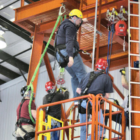Affordable First Aid and CPR Training in Mississauga: Ensure Workplace Safety with Forklift Training
In today’s fast-paced work environment, ensuring the safety of your employees is paramount. This is especially true in industries where heavy machinery, such as forklifts, is an integral part of daily operations. Forklift Training Mississauga recognizes the importance of a comprehensive safety approach, which includes not only forklift training but also First Aid and CPR courses. In this blog post, we will delve into the significance of First Aid and CPR training in the workplace and how we offer affordable solutions for businesses in the area.
Importance of First Aid and CPR Training
Accidents can happen anytime, anywhere, and being prepared to respond promptly can make a crucial difference in saving lives. First Aid and CPR training equip individuals with the necessary skills to provide immediate care until professional medical help arrives. In a workplace where forklifts are in operation, the potential for accidents and injuries exists, making it imperative for employees to be trained in First Aid and CPR.
One of the key advantages of having employees trained in First Aid and CPR is the ability to respond quickly and effectively to emergencies. In the event of an accident involving a forklift, immediate action can mean the difference between life and death. Having trained personnel on-site increases the chances of minimizing the severity of injuries and facilitating a faster recovery process.
What is covered in First Aid and CPR Training?
First Aid and CPR (Cardiopulmonary Resuscitation) courses are designed to equip individuals with the knowledge and skills needed to respond effectively to emergencies, particularly those involving injuries or sudden cardiac arrest. They cover the following key elements:
Basic Life Support (BLS):
- CPR Techniques: Participants are taught how to perform CPR on adults, children, and infants. This includes chest compressions, rescue breathing, and the use of automated external defibrillators (AEDs).
- Recognizing Cardiac Arrest: Training includes recognizing the signs of cardiac arrest and the importance of early intervention.
- Hands-Only CPR: This technique involves chest compressions without rescue breaths and is often emphasized for laypersons.
First Aid:
- Scene Safety and Assessment: Trainees learn to assess the safety of the scene before assisting and to assess the condition of the victim.
- Choking Response: Techniques for helping a choking victim, including abdominal thrusts (Heimlich maneuver).
- Bleeding Control: Instruction on controlling bleeding through direct pressure, elevation, and the use of bandages or tourniquets if necessary.
- Shock Management: Understanding and managing shock in emergency situations.
- Burn Care: Basic care for thermal and chemical burns, including cooling the burn and protecting it from further injury.
- Fracture and Sprain Management: Techniques for stabilizing fractures and managing sprains and strains.
- Allergic Reactions: Recognition and treatment of allergic reactions, including the use of epinephrine auto-injectors (e.g., EpiPen).
- Seizure Response: Appropriate response to seizures, including creating a safe space and offering support.
AED Usage:
- Automated External Defibrillator (AED) Training: Participants learn how to use an AED to deliver electric shocks to restore normal heart rhythm in cases of sudden cardiac arrest.
Special Considerations:
- Infant and Child CPR and First Aid: Specific techniques for providing CPR and first aid to infants and children, considering their unique needs.
- CPR and First Aid for Healthcare Providers: Specialized training for healthcare professionals, addressing the unique challenges and protocols they may encounter.
Legal and Ethical Considerations:
- Good Samaritan Laws: Understanding the legal protections afforded to individuals providing emergency assistance in good faith.
- Ethical Decision-Making: Discussion of ethical considerations in emergencies.
Ongoing Practice and Renewal:
- Regular Renewal: Given that skills can fade over time, participants are encouraged to renew their certifications regularly, typically every one to two years.
Affordable First Aid and CPR Training in Mississauga
Understanding the financial constraints that businesses often face, we offer affordable First Aid and CPR courses tailored to the needs of the local community. The emphasis is not only on cost-effectiveness but also on providing high-quality training that meets or exceeds industry standards.
Customized Training Solutions
Forklift Training Mississauga understands that each workplace is unique, and the training needs may vary. To address this, they offer customized training solutions that cater to the specific requirements of businesses. Whether it is a small office or a large industrial facility, the training programs can be adapted to the size and nature of the workforce.
First Aid & CPR Training Mississauga
Forklift Training Mississauga recognizes the synergy between forklift training and First Aid/CPR training. By incorporating these elements into a comprehensive safety program, businesses can create a secure working environment.
Benefits of First Aid and CPR Training
Apart from the obvious advantages of being prepared for emergencies, there are several other benefits associated with providing First Aid and CPR training to employees:
- Reduced Response Time: Trained individuals can respond more quickly to emergencies, potentially saving lives and preventing further injuries.
- Increased Employee Confidence: Knowing that they have the skills to handle emergencies can boost the confidence of employees, creating a more secure and positive work environment.
- Compliance with Regulations: Many industries have regulations in place that require employees to undergo First Aid and CPR training. We ensure that businesses stay compliant with these regulations.
- Enhanced Team Morale: When employees see that their well-being is a priority for the company, it fosters a sense of belonging and improves overall team morale.
Conclusion
In conclusion, prioritizing the safety of your workforce is a strategic move that not only safeguards your employees but also contributes to the overall success of your business. Forklift Training Mississauga stands out as a reliable partner in this endeavor, offering affordable and customized First Aid and CPR training solutions. By investing in the well-being of your employees, you are investing in the longevity and prosperity of your business. Take the proactive step towards a safer workplace by enrolling your team in Forklift Training Mississauga’s comprehensive safety programs today.






